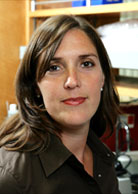非常抱歉,
你要访问的页面不存在,
非常抱歉,
你要访问的页面不存在,
非常抱歉,
你要访问的页面不存在,
验证码:

职称:Assistant Professor, Department of Microbiology, Immunology and Molecular Genetics Member, Eli and Edythe Broad Center of Regenerative Medicine and Stem Cell Research Member, ACCESS Department - Microbiology, Immunology and Molecular Genetics Member, JCCC Cancer and Stem Cell Biology Program Area
所属学校:University of California-Los Angeles
所属院系:Department of Life Sciences Core Education
所属专业:Biochemistry
联系方式:(310) 794-4059
Dr. April Pyle's laboratory is primarily interested in dissecting cell fate decisions required to maintain stable, pluripotent human embryonic stem cells (hESCs) and how this information may be applicable to embryonic development and cellular specification. How hESCs make decisions to survive, self-renew or differentiate is not currently well understood. Her research focuses on understanding the molecular mechanisms associated with cell fate decisions and what happens when these decisions go awry, leading to cellular transformation. It is becoming increasingly evident that genes known to perform critical roles during early embryogenesis, particularly during stem cell renewal, pluripotency and survival are also expressed during the development of cancer. Pyle's lab will use hESCs as a model system to examine not only stem cell biology and differentiation, but also to improve our understanding of cancer progression and human development.
Dr. April Pyle's laboratory is primarily interested in dissecting cell fate decisions required to maintain stable, pluripotent human embryonic stem cells (hESCs) and how this information may be applicable to embryonic development and cellular specification. How hESCs make decisions to survive, self-renew or differentiate is not currently well understood. Her research focuses on understanding the molecular mechanisms associated with cell fate decisions and what happens when these decisions go awry, leading to cellular transformation. It is becoming increasingly evident that genes known to perform critical roles during early embryogenesis, particularly during stem cell renewal, pluripotency and survival are also expressed during the development of cancer. Pyle's lab will use hESCs as a model system to examine not only stem cell biology and differentiation, but also to improve our understanding of cancer progression and human development.